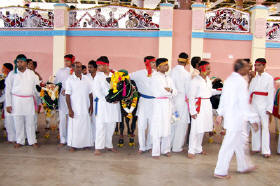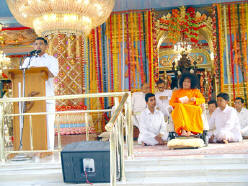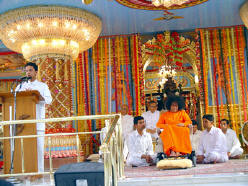Sri Krishna Jansmashtami celebrates the birth of Lord Krishna, the Avatar of the Dwapara Age. Many are the saints of this land who have dedicated their life to the adoration and veneration of Lord Krishna. Tulsidas, Meerabai, Chaitanya Deva and Purandaradasa poured out their devotion to Lord Krishna in the form of songs which remain popular in Bharat even to this day. The story of His life and His leelas (Divine sport) has enchanted the people of Bharat for millennia, for it tells us about God’s pure love for His devotees. Krishnashtami is a festival whose celebration is marked by fun and gaiety that recalls the joy experienced by the gopaas and gopees (cowherds) in the company of Krishna during His childhood days at Brindavan.
At
Prasanthi Nilayam, this experience is enhanced by the presence of the same
Lord Krishna who has come again as our beloved Bhagawan Sai Krishna. On the
morning of 27th, students of Bhagawan’s university, dressed up as
gopis and each
 leading a cow,
arrived in a procession at the Sai Kulwant Hall amidst singing of Bhajans
and chanting of Vedic hymns. Sai Geeta, the elephant, too was led, richly
caparisoned, into the hall. To the delight of all who had gathered there,
Bhagawan lovingly fed Sai Geeta with fruits. After these joyful festivities
in the morning, Bhagawan retired to His residence.
leading a cow,
arrived in a procession at the Sai Kulwant Hall amidst singing of Bhajans
and chanting of Vedic hymns. Sai Geeta, the elephant, too was led, richly
caparisoned, into the hall. To the delight of all who had gathered there,
Bhagawan lovingly fed Sai Geeta with fruits. After these joyful festivities
in the morning, Bhagawan retired to His residence.
In the
afternoon, after a programme of devotional songs and
stotrams (hymns) by students, Bhagawan
blessed two speakers to address the gathering. The first speaker was Dr. M.
Sainath, a lecturer in the Department of Physics, Sri Sathya Sai Institute
of Higher Learning. Dr. Sainath began by recalling how Bhagawan had once
outlined the three stages an aspirant passes through on his path to Self
Realization. In the first stage, the devotee says to the Lord, ‘Dasoham’, I
am Your servant. As he progresses, the syllable ‘Da’ drops off, and he says
‘Soham’, I am That. Ultimately, he reaches that Supreme state when even the
notion of duality is extinguished and all that remains is ‘Aham’, I am I.
Sri Sainath said that on the spiritual path, the role of the Master is that
of turning the focus of the disciple towards the goal. A bale of cotton
placed in the sun does not ignite by itself. It is only when the rays of the
sun are focused on the cotton by a magnifying glass that it can be lit. In a
similar manner, the Master, by showering His Grace, lights the lamp of
 Wisdom in our
hearts. He gave the example of a disciple of Sant Tukaram, who prayed to him
to reveal how he could always abide in a state of bliss and peace. Tukaram
looked deeply into the disciple’s eyes and then said, “Son, do you know that
you have but a week to live?” The disciple was all in a tizzy on hearing
this and rushed home. For the first two days, he was agitated, thinking of
all the things he was yet to accomplish in his life. But, soon he was able
to turn his mind towards the contemplation of God, and by the seventh day he
had entered a state of deep peace and surrender. He came to Sant Tukaram who
asked him to narrate what he had undergone in the past week. The disciple
told him that now he had no thoughts of the world, instead his mind was now
focused on God. Tukaram then revealed to him that it was to teach him the
secret of equanimity that he played out this little drama. Dr. Sainath said
that we now have amidst us that very same Krishna who had taught Arjuna the
Bhagavad Gita, the song celestial which is the panacea for all ills suffered
by mankind today, and we must make full use of this opportunity to be in the
company of the universal teacher to realize our own divinity.
Wisdom in our
hearts. He gave the example of a disciple of Sant Tukaram, who prayed to him
to reveal how he could always abide in a state of bliss and peace. Tukaram
looked deeply into the disciple’s eyes and then said, “Son, do you know that
you have but a week to live?” The disciple was all in a tizzy on hearing
this and rushed home. For the first two days, he was agitated, thinking of
all the things he was yet to accomplish in his life. But, soon he was able
to turn his mind towards the contemplation of God, and by the seventh day he
had entered a state of deep peace and surrender. He came to Sant Tukaram who
asked him to narrate what he had undergone in the past week. The disciple
told him that now he had no thoughts of the world, instead his mind was now
focused on God. Tukaram then revealed to him that it was to teach him the
secret of equanimity that he played out this little drama. Dr. Sainath said
that we now have amidst us that very same Krishna who had taught Arjuna the
Bhagavad Gita, the song celestial which is the panacea for all ills suffered
by mankind today, and we must make full use of this opportunity to be in the
company of the universal teacher to realize our own divinity.
 Sri Shashank
Shah, currently pursuing his M.Phil in Management at Bhagawan’s university,
who spoke next, drew a number of interesting parallels between the lives of
Sri Krishna and the Avatar of the Kali age, Bhagawan Sri Sathya Sai Baba. He
narrated a charming incident from the epic poem Bhagavatam that records the
story of Lord Krishna’s life, where Sage Garga, a devotee of Lord Vishnu,
prepared kheer, a dish said to be dear
to Lord Vishnu, and offered it to Him. The child Krishna, sneaked in as the
sage was praying and consumed the kheer.
The sage was outraged and complained to Mother Yashoda. Yashoda admonished
Krishna not to disturb the sage in that manner. The sage again sat down to
dedicate the kheer to Lord Vishnu and
again it was Krishna who partook of it. Sage Garga asked Krishna why He was
behaving so strangely; then Krishna then revealed to the sage that He was
none other than Lord Vishnu Himself, and granted him the celestial
Vishwarupa Darshan, the vision of the Cosmic Form of Lord Vishnu. This
incident finds a parallel in the life of Bhagawan. A devotee who had the
privilege of sleeping at the door of Bhagawan’s quarters in the Prasanthi
Mandir, noticed an ethereal light coming out of Bhagawan’s room one night.
He looked in and what he saw left him dumbfounded. He saw Bhagawan in the
posture of Seshasayee, the reclining posture of Lord Vishnu, surrounded by
seven fires. He was left dazed by what he had seen. The next morning, the
day of Vaikuntha Ekadashi, held very scared by worshippers of Lord Vishnu,
Bhagawan confirmed the truth of what he had seen by revealing to him that
the seven fires he had seen were none other than the Saptarishis, the seven
great sages.
Sri Shashank
Shah, currently pursuing his M.Phil in Management at Bhagawan’s university,
who spoke next, drew a number of interesting parallels between the lives of
Sri Krishna and the Avatar of the Kali age, Bhagawan Sri Sathya Sai Baba. He
narrated a charming incident from the epic poem Bhagavatam that records the
story of Lord Krishna’s life, where Sage Garga, a devotee of Lord Vishnu,
prepared kheer, a dish said to be dear
to Lord Vishnu, and offered it to Him. The child Krishna, sneaked in as the
sage was praying and consumed the kheer.
The sage was outraged and complained to Mother Yashoda. Yashoda admonished
Krishna not to disturb the sage in that manner. The sage again sat down to
dedicate the kheer to Lord Vishnu and
again it was Krishna who partook of it. Sage Garga asked Krishna why He was
behaving so strangely; then Krishna then revealed to the sage that He was
none other than Lord Vishnu Himself, and granted him the celestial
Vishwarupa Darshan, the vision of the Cosmic Form of Lord Vishnu. This
incident finds a parallel in the life of Bhagawan. A devotee who had the
privilege of sleeping at the door of Bhagawan’s quarters in the Prasanthi
Mandir, noticed an ethereal light coming out of Bhagawan’s room one night.
He looked in and what he saw left him dumbfounded. He saw Bhagawan in the
posture of Seshasayee, the reclining posture of Lord Vishnu, surrounded by
seven fires. He was left dazed by what he had seen. The next morning, the
day of Vaikuntha Ekadashi, held very scared by worshippers of Lord Vishnu,
Bhagawan confirmed the truth of what he had seen by revealing to him that
the seven fires he had seen were none other than the Saptarishis, the seven
great sages.
After the talks by Dr. Sainath and Sri Shashank Shah, bhajans were sung and arati was offered to Bhagawan before He retired to His residence.
Jai Sai Ram!